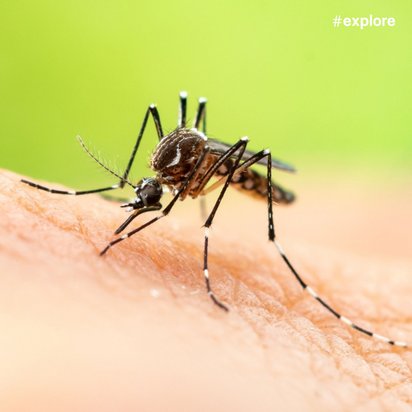Why are mosquitoes deterred by insect spray?
How chemistry drives away insects.

How chemistry drives away insects.

August 01, 2024
Summer time is mosquito time. On vacation by the lake, the small annoying insects cause frantic clapping on arms or thighs and sleep-depriving itching with scratching attacks at night. What makes us so attractive to mosquitoes in the first place, and why can they be repelled with insect spray?
Mosquitoes are attracted to us. More precisely, to our scent, even more precisely: to our emissions. The carbon dioxide in exhaled air puts mosquitoes on our trail. Because pregnant women basically breathe for two and also have a higher body temperature, they count among the particularly preferred victims of female mosquitoes. These require the iron and proteins from the blood meal for the development of their own offspring – the development of their eggs.
The prospective mosquito mothers also smell our sweat and the scent cocktail on our skin: ammonia, lactic acids and fatty acids. Depending on our genes and our current metabolism and hormone balance, we produce these substances in different quantities. One of the reasons why mosquitoes sting one person more, another less often. The various mosquito species also seem to have certain preferences: some prefer ammonia, others are attracted to lactic acid. Possibly our blood type also makes us differently attractive to mosquitoes: A Japanese research group found that test subjects with blood type 0 were twice as attractive to the Asian tiger mosquito as those with blood type A. Since only 64 people participated in the study, the findings are only conditionally reliable.
In any case, it's certain: We can all temporarily reduce our attractiveness to mosquitoes: A shower washes the enticing sweat from the skin and can thus provide short-term protection from bites. Even with a fan, one's own body odor can be swirled around and mosquitoes can be diverted from their trail. But unfortunately, we can't stand under the shower all day. And a fan isn't always at hand during an evening walk either.
This is where insect sprays come into play. The magic word here is: repellents. Translated, this means repellers. And somewhat more freely translated: deterrents. These contain, for example, diethyltoluamide (DEET) or icaridin, which are unusual in nature. Applied thoroughly and without gaps, these overlay our body's own fragrances. They make us invisible not only to mosquitoes, but also to other insects – a camouflage cloak from a spray can, so to speak.
DEET was developed and patented by the US Army in the 1940s. It was primarily used during overseas deployments in mosquito-infested areas in Southeast Asia, for example in the Vietnam War. From 1957, DEET was then also approved for civilians and marketed from the mid-1960s. These should not be younger than two years old or pregnant or currently breastfeeding a child. In these cases, application must be avoided. And unlike the skin-compatible icaridin, DEET attacks plastics and leather. It should therefore not come into contact with sunglasses or watch straps. Icaridin, in turn, can damage the larvae of tailed amphibians or other amphibians according to a study. So anyone who goes into the quarry pond in summer might better reach for a different product.
This is an article from #explore. #explore is a digital journey of discovery into a world that is rapidly changing. Increasing connectivity, innovative technologies, and all-encompassing digitalization are creating new things and turning the familiar upside down. However, this also brings dangers and risks: #explore shows a safe path through the connected world.